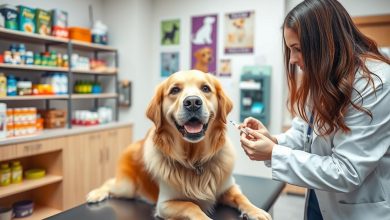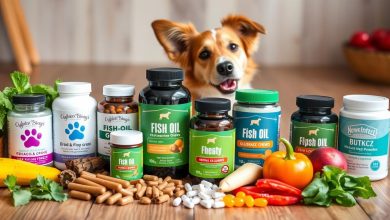Dental Care for Dogs: Tips to Prevent Tooth Decay
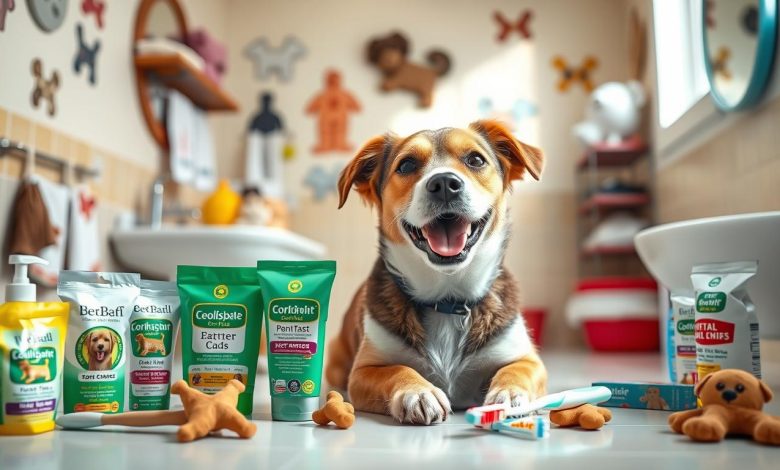
What if a simple habit could make a big difference in your dog’s health? Regular dental care is key to stop tooth decay in dogs. It’s simpler than you might think. By following some easy dog teeth cleaning tips, you can avoid painful and expensive dental problems for your pet.
As a caring dog owner, knowing about dental care is vital. It helps prevent tooth decay in dogs. In this article, we’ll dive into dog dental care. We’ll share useful tips to keep your dog’s teeth clean and healthy.
Key Takeaways
- Regular dental care for dogs can help prevent tooth decay and gum disease.
- Dog teeth cleaning tips can be simple and easy to follow.
- Preventing tooth decay in dogs can improve their overall health and wellbeing.
- A consistent dental care routine is essential for maintaining healthy teeth and gums.
- By following these tips, you can help reduce the risk of painful and costly dental issues in your dog.
Understanding the Importance of Canine Dental Health
Keeping your dog’s teeth clean is key to their health. Regular pet teeth cleaning and canine oral hygiene prevent tooth decay and gum disease. As a dog owner, knowing about dog dental health is crucial. It helps keep your dog’s teeth and gums in top shape.
Dogs can face dental issues like tartar buildup, gingivitis, and periodontal disease. These problems can cause bad breath, loose teeth, and even heart disease. By focusing on dog dental health and canine oral hygiene, you can avoid these issues. This ensures your dog stays healthy and happy.
Common Dental Problems in Dogs
- Tartar buildup
- Gingivitis
- Periodontal disease
Impact of Poor Dental Health on Overall Well-being
Poor dental health can harm a dog’s overall health. It can lead to bad breath, loose teeth, and heart disease. Regular pet teeth cleaning and canine oral hygiene can prevent these problems. This keeps your dog healthy and happy.
Signs of Dental Issues in Dogs
Look out for signs like bad breath, yellow or brown teeth, and loose teeth. If you see these signs, take your dog to the vet. They can help find the best treatment and prevent further problems.
| Signs of Dental Issues | Description |
|---|---|
| Bad breath | Unpleasant odor from the mouth |
| Yellow or brown teeth | Discoloration of the teeth due to tartar buildup |
| Loose teeth | Teeth that are loose or falling out |
Essential Steps in Dog Dental Care Routine
Keeping a dog’s teeth clean is key to their health. Dog teeth brushing removes plaque and tartar, preventing dental issues. Regular dog dental exams catch problems early.
The right dog dental care products are vital. These include toothbrushes, toothpaste, and dental chews made for dogs. Using these products helps prevent tooth decay and dental problems.
Here are some tips for making dental care a positive experience for dogs:
- Start with short sessions of dog teeth brushing and gradually increase the duration
- Use dog dental care products that are specifically designed for dogs
- Make dog dental exams a regular part of the dental care routine
By following these steps and using the right dog dental care products, owners can keep their dogs’ teeth healthy. Regular dog dental exams and dog teeth brushing catch issues early, preventing bigger problems.
| Dental Care Product | Description |
|---|---|
| Toothbrushes | Designed for dogs, these toothbrushes help remove plaque and tartar |
| Toothpaste | Specifically designed for dogs, this toothpaste helps clean teeth and freshen breath |
| Dental Chews | Help reduce tartar and plaque, promoting good oral health |
Professional Dental Care for Your Dog
Regular at-home dental care is key, but professional care is also vital. Dog dental exams are crucial for your dog’s health. They help prevent gum disease. During these exams, a vet checks your dog’s teeth and gums for any issues.
Preventing gum disease in dogs requires regular teeth cleaning by a vet. This removes plaque and tartar from your dog’s teeth. It helps keep their teeth and gums healthy.
It’s important to schedule dog dental exams regularly. The needed frequency depends on your dog’s age, breed, and health. Dogs usually need a dental exam once a year. But some may need more frequent visits. Regular dental care helps prevent gum disease and keeps your dog happy and healthy.
| Service | Cost | Frequency |
|---|---|---|
| Dog Dental Exam | $50-$100 | Annually |
| Dog Teeth Cleaning | $100-$300 | As needed |
Investing in professional dental care is important. It includes regular dog dental exams and teeth cleaning. This helps prevent gum disease and ensures your dog lives a long, healthy life.
How to Brush Your Dog’s Teeth Properly
Brushing your dog’s teeth is key to their oral health for pets. It’s important to do it right to avoid dental issues. First, pick the right dog dental care products, like a toothbrush and toothpaste made for dogs. Choose a toothbrush that fits your dog’s mouth well and has the right bristles.
A soft-bristled toothbrush is best because it’s gentle on your dog’s gums. For small dogs or those who are nervous, a finger toothbrush is a good choice. When picking toothpaste, make sure it’s for dog teeth brushing and fights tartar and plaque.
Start by letting your dog get used to the toothbrush and toothpaste. Let them sniff and lick it before brushing. Once they’re okay with it, brush their teeth gently in circles. Pay special attention to where teeth and gums meet, as plaque and tartar build up here.
Regular dog teeth brushing can prevent dental problems like gum disease and bad breath. Use the right dog dental care products and brush regularly. This keeps your dog’s teeth and gums healthy for a long time. Make brushing a fun experience for both of you.
| Product | Description | Price |
|---|---|---|
| Dog Toothbrush | A soft-bristled toothbrush designed for dogs | $5-$10 |
| Dog Toothpaste | A toothpaste specifically designed for dogs, containing ingredients to prevent tartar and plaque buildup | $5-$15 |
Best Products for Dog Dental Care: Tips to Prevent Tooth Decay
Keeping your dog’s teeth clean is key. A good routine includes brushing, dental chews, and water additives. We’ll look at the top products for dog dental care, like toothbrushes, toothpaste, dental wipes, sprays, and water additives.
Dog Toothbrushes and Toothpaste Options
Finding the right toothbrush and toothpaste for your dog can be tough. Look for toothbrushes with soft bristles and toothpaste made for dogs. Human toothpaste is harmful to them. Brands like Oxyfresh and Petrodex are popular choices.
Dental Wipes and Sprays
Dental wipes and sprays are easy to use in your dog’s care. They help fight plaque, freshen breath, and kill bacteria. Vet’s Best and Oratene are well-liked options.
Water Additives for Dental Health
Water additives can cut down on bacteria and make your dog’s breath smell better. They’re added to their water. Brands like Oxyfresh and Healthymouth are good choices.
Using these products can help stop tooth decay and keep your dog’s mouth healthy. Always talk to your vet before adding new products to your dog’s routine.
| Product | Description | Price |
|---|---|---|
| Oxyfresh Toothpaste | Non-foaming toothpaste for dogs | $10 |
| Vet’s Best Dental Wipes | Convenient dental wipes for dogs | $15 |
| Healthymouth Water Additive | Water additive for dental health | $20 |
Effective Dental Treats and Chews
Dog dental treats are great for keeping your dog’s teeth clean. They help cut down on tartar and plaque. This makes your dog’s teeth strong and healthy.
When picking dental treats and chews, think about a few things:
- Look for products with the Veterinary Oral Health Council (VOHC) seal
- Choose treats that fit your dog’s size and age
- Think about your dog’s special needs, like sensitive teeth or gums
A good dental care plan includes brushing, dog dental treats, and vet visits. By doing these tips for healthy dog teeth, you can avoid oral health problems. Always talk to your vet before trying new dental treats or chews.
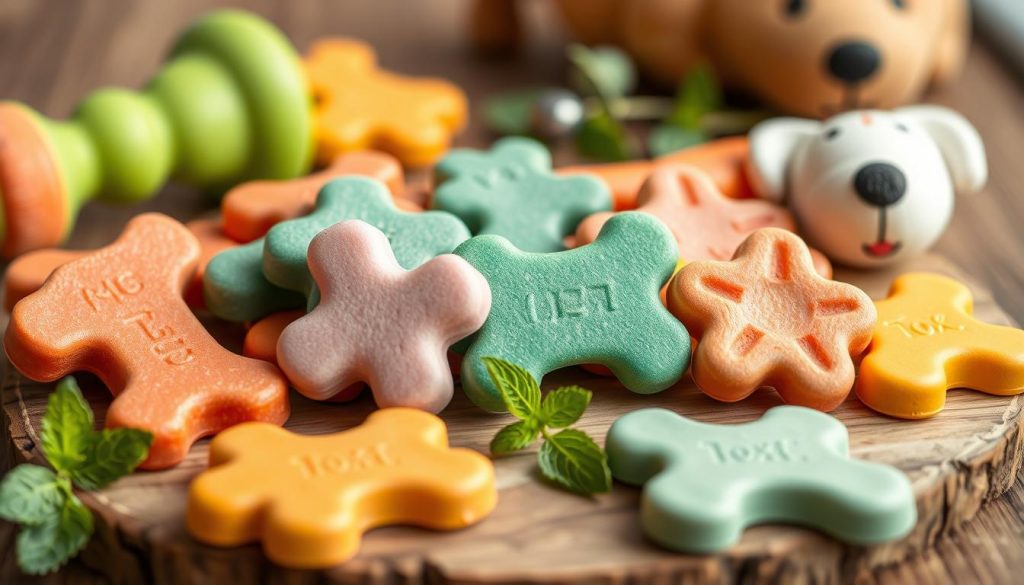
Popular dog dental treats include dental chews, rawhide, and bully sticks. They help fight tartar and plaque. This keeps your dog’s teeth and gums healthy. Make sure to pick high-quality, safe treats for your dog.
| Treat Type | Benefits |
|---|---|
| Dental Chews | Help reduce tartar and plaque, promote healthy teeth and gums |
| Rawhide | Help reduce tartar and plaque, satisfy your dog’s natural urge to chew |
| Bully Sticks | High in protein, low in fat, help reduce tartar and plaque |
Natural Remedies for Dog Dental Health
Many dog owners choose natural remedies for their pet’s dental health. This method helps prevent tooth decay and supports overall dental care. Natural remedies include home treatments and dietary changes.
Safe Home Remedies
Safe home remedies include brushing your dog’s teeth with water and baking soda. You can also add parsley oil to their food for fresher breath. A raw food diet can also help prevent tooth decay.
Dietary Considerations for Dental Health
Diet is key in dog dental care. A balanced diet with fruits and vegetables helps prevent tooth decay. Adding supplements to their food can also support dental health.
Using natural remedies in your dog’s dental care routine is beneficial. It helps prevent tooth decay and supports dental health. Always talk to your vet before trying new remedies or supplements.
Preventing Gum Disease and Periodontal Issues
Keeping your dog’s teeth and gums healthy is key. Gum disease, or periodontal disease, is common in dogs. It happens when bacteria build up, causing inflammation and infection. If not treated, it can lead to bad breath, loose teeth, and even heart disease.
Spotting early signs is crucial. Look for red, swollen gums, yellow or brown teeth, and bad breath. Regular vet visits can catch these problems early. Brushing your dog’s teeth at home also helps prevent gum disease.
Early Warning Signs
- Red and swollen gums
- Yellow or brown teeth
- Foul odor from the mouth
- Loose teeth
Preventive Measures
To prevent gum disease, mix professional dental care with home care. Brushing, dental chews, and a balanced diet are key. These steps protect your dog’s teeth and gums from disease.
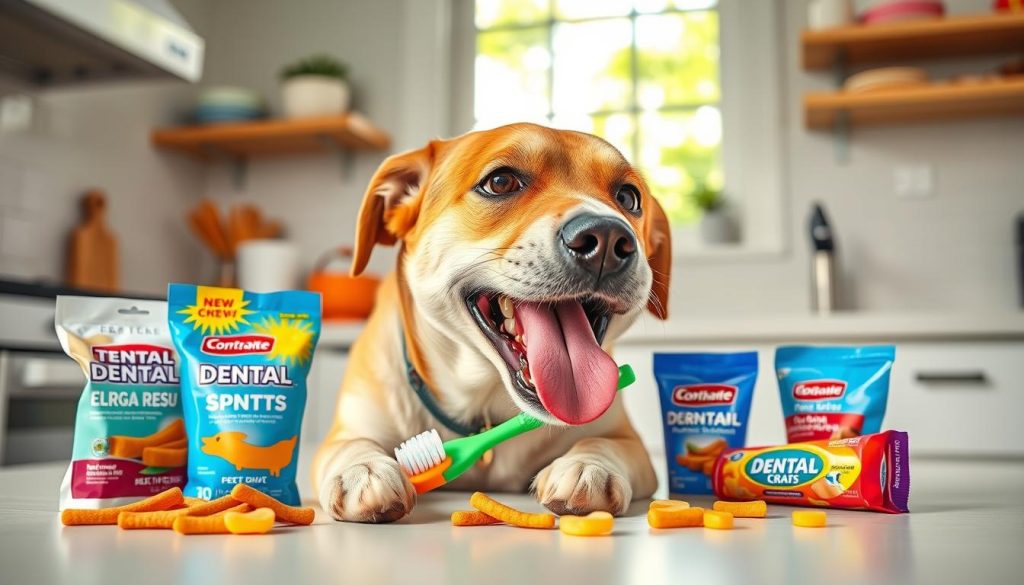
Focus on preventing gum disease and keeping your dog’s mouth clean. Regular vet visits and good oral hygiene are essential. They help avoid gum disease and related health issues.
Breed-Specific Dental Care Considerations
Different breeds have unique dental needs. Some are more likely to face dental problems. For example, small breeds like Chihuahuas and Poodles often get tooth decay and gum disease. This is because their small jaws and crowded teeth make it hard to clean their teeth.
Knowing your dog’s breed-specific dental needs is key. For instance, Bulldogs and Pugs need regular tooth and gum cleaning. This helps prevent bacteria and tartar buildup. On the other hand, big breeds like German Shepherds and Labradors should get checked for periodontal disease often.
Here are some important points for breed-specific dog dental care:
- Small breeds: Focus on preventing tooth decay and gum disease with regular brushing and dental checks.
- Large breeds: Monitor for signs of periodontal disease and provide regular dental cleanings.
- Brachycephalic breeds: Pay attention to dental issues related to their unique jaw structure and provide regular cleaning and checks.
By tailoring your dog’s dental care to their breed, you can prevent common dental issues. This ensures they have a healthy, happy smile. Always talk to your vet for personalized breed-specific dental care advice and dog teeth cleaning tips.
Conclusion: Building a Lifetime of Healthy Dental Habits
Keeping your dog’s dental health in check is key to their happiness. By following the tips in this article, you can prevent tooth decay and keep their teeth healthy for life. Brushing regularly, using dental treats, and getting professional cleanings are all important steps.
Early treatment of dental problems can prevent a lot of pain for your dog. By being consistent with their oral care, you’ll see big benefits in the long run. This dedication will keep your dog’s dental health in top shape, ensuring they stay happy and full of energy for years to come.


